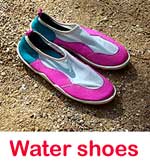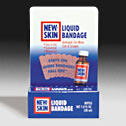Thailand packing list
- Personal medication - If
you are allergic to bee stings, you are likely allergic to jellyfish stings also. Bring your medicine.
- Personal hygiene items such as soap, shampoo, insect repellent, etc. Note: Soap and shampoo are provided at the
resort on Koh Yao Noi in Phang Nga Bay
- Sunscreen or sunblock (SPF15 or greater). The absolute best sun protection we've found is actually locally-made.
Check out REEF REPAIR SUNSCREEN. It's environmentally safe.
- Lip
balm (protector/moisturizer/sunblock).
- Rainwear
and/or 'warm-when-wet' types of clothing such as some of
the new synthetic cloths. December through March is
usually very dry.

- Hat
that is light weight, light colored, and throw an extra
hat in too.
- Sunglasses and safety strap. An extra pair of sunglasses is a
good idea.
- A small waterproof flashlight.
- Water
shoes - Wetsuit booties are a bit too hot. Crocs don't stay on feet properly in water, but they'll work. Strap sandals are ok, though velcro and sand don't work together well.
- An
extra pair of sandals (Dave learned this the
hard way when he had to wear a pair of undersized light
purple flowery shoes for a whole week in Laos on one
trip... they were the only pair in Vientiane close to
his required size 13).
- Lightweight
gloves with non-slip gripping surface if you have
tender hands. This is also a good idea of you have
sun-sensitive skin. A sunburn on the back of your hands is
not pleasant.
- Lightweight, light-colored, long-sleeve shirt if you are sensitive to the sun. Wearing protection against the sun
during the midday hours is a good idea for anyone coming to an Asian country.
- If you bring a non-waterproof camera, you may wish to bring your own pre-tested watertight container. We
provide a quality dry bag for each person, but in a humid climate, moisture can sometimes be sealed in along with the camera. Bring a hand towel or small towel to wrap your
camera while in the dry bag. It's good padding and it's helpful in case you've got sweaty or wet hands.
- Extra memory cards and batteries.

- You need a small amount of money for dinner, incidentals, personal items, tips, etc.
- If you are a light sleeper, you might want to bring some EAR PLUGS.
- Your personal paddle if you wish.
- Clothes Line
- bring about 10 feet of light string to make a clothes line. Bring a few clothes pins too.
- Jewelry and make-up are not necessary. If you don't bring it, you can't loose it.
Naturally we respect Thai cultural values. This means the local people can be easily offended by scantily dressed Westerners. It is particularly important that women realize in
Muslim areas, it is very important not to appear in bikinis or other clothing that people of more traditional cultures would consider provocative or offensive. In other words, you won't
be able to wear your bikini around the fishing villages. A pair of shorts and a shirt will do. Once on the water, you can do as you please.
Health Matters
In our experience, Thailand is a safe, healthy country for normal activities.
Thailand does not necessarily require any particular immunization for your visit. Cholera, Yellow Fever, Tetanus & Diphtheria, Typhoid, and Gamma Globulin are some of the
vaccinations that you should consider. We still recommend that you consult your physician for recommended inoculations before departure to Asian destinations.
Note: Malaria and Dengue Fever
are present in Thailand in areas where it used to be uncommon.
During the rainy season, April through November, it is advised
that you take all precautions to avoid contact with the
mosquitoes.
Additional Insurance
Acquiring travel insurance policy that covers theft, loss and
medical treatment is recommended. Make sure the insurance also
covers the activities that you will be undertaking during your
stay... such as kayaking. If you are participating is a
strenuous/extreme activity, it makes sense to buy evacuation
insurance too. Cancellation insurance is a nice option too.
Personal Medical Kit List
Note: We have a first aid kit on
all of our trips. For legal reasons however, tour operator
first aid kits do not normally contain lotions and potions. A
First Aid is just that, the first medical care you receive for
accidents and injuries. This is initial wound management only.
If you would like to bring your own or if you will be
traveling to other destinations before or after your Paddle
Asia adventure, here is our suggested list of contents:
- One
very useful addition to any first aid kit is New Skin.
This is a liquid bandage, which is both an antiseptic and
waterproof. It creates a plastic shield over the wound.
This is very appropriate for the tropics.
- Aspirin
or Panadol - for pain or fever.
- Antihistamine
- useful as a decongestant for colds, allergies, to ease
the itch from insect bites and stings or to help prevent
motion sickness.
- Antibiotics
- useful if you are traveling well off the beaten track
but they must be prescribed. You can however, get
antibiotics over the counter in Thailand.
- Kaolin
preparation (Pepto-Bismol), Imodium or Lomotil - for upset
stomach or diarrhea.
- Rehydration
mixture - for rehydration as well as treatment of severe
diarrhea.
- Topical
antiseptic - mercurochrome, antibiotic powder, or similar
'dry' spray - for cuts and abrasions.

- Calamine
lotion - to ease irritation from bites or stings.
- Bandages
and Band-Aids (plasters) - for minor injuries.
- Scissors.
- Tweezers.
- Thermometer.
- Insect
repellent.
- Sun
block and/or suntan lotion.
- Chapstick
lip protection.
- Water-purification
tablets if you plan on camping... not needed on our guided
tours.
- Throat
lozenges.
- Moleskin
- for blisters.
- Sulamyd
10% eye drops.
- Acetaminophen
(Paracetamol).
- Antacid
tablets.
A simple medical kit can be very useful and won't take too
much space in your baggage. Prevention, of course, is the best
form of medicine.
Travel Tips
- Use
caution in what you eat and drink. Stomach upsets are the
most likely travel health problem but the majority of
these upsets will be relatively minor.
- Drink
bottled water only. Don't drink water with ice unless the
ice has a "hole" in it, although sometimes they crush this
type of ice too. In Thailand, the ice with a hole is from
proper drinking water. Basically, no one in Thailand
drinks tap water nor uses tap water for ice.
- To play
it extra safe, tea or coffee is recommend since the water
would have been boiled.
- Be
cautious when drinking fruit juice, particularly if water
was added. Canned fruit juices are OK.
- Salads
and fruit should be washed with purified water or peeled
whenever possible.
- Thoroughly
cooked food is the safest but not if it has been left to
cool. Many restaurants cook their food in the morning and
leave it out all day. It's usually OK, but if you are very
sensitive, you might get a bit of an upset stomach.
- Wash
your hands regularly. It's quite easy to contaminate your
own food.
- You
should brush your teeth with purified water rather than
tap water.
- Wear
shoes. You can get worm infections through bare feet.
- Try to
avoid insect bites by using insect repellents or by covering bare skin.
Passport Protection
Losing your passport is a big deal. You can get a new one at your country's embassy in Bangkok. To make this nightmare easier to handle, carry a copy of your passport and birth
certificate in a different place from where you carry your passport.




